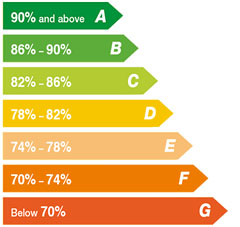On the way to work the other morning I saw an elderly man staring contemplatively into a greenbelt area just by the footpath that goes under the thundering motorway bridge. It was a strange moment – the noise and (let’s be frank here…) smell of the traffic overhead, and suddenly there’s this little pocket of bucolic calm at the edge of the city centre. I don’t know what the elderly man was staring at in the green area – maybe he’d spotted a rabbit or some other wildlife.
The man must have been about the same age as my grandmother, who passed away recently. It got me thinking about her generation and their attitude to sustainable living – not that there was anything that went by that name in her day! My grandmother’s generation were thrifty folks – they’d never think about throwing socks away because of a hole. They’d fix the hole and (sorry) darn well keep wearing the socks.
Foodwise, there was very little waste. In the war and post-war years folks didn’t have much on the table, and even though people tried to have meat on every dinner table, towards the end of the week when money was tight the main meal would be a fried egg with some chips (to anyone from USA reading, in the UK a ‘chip’ is like a french fry, except thicker and not crispy).
Carbon-wise again, granny’s generation were pretty light – they used public transport, and sent the kids out to pick up the groceries (or ‘messages’ as they called it). And the groceries that they bought were before the days of african potatoes and celery from far-off foreign lands. This stuff had to be local.
So, all in all they were a pretty carbon-light bunch. The fact that about three generations back my family pretty much all mined or sold coal is just a light irony here.
But they could have improved. They had some pretty daft ideas about the nature of heat and cold. They would drink scalding hot tea (NEVER coffee) in the belief that the heat was ‘doing them good’. Ouch. They’d also boil the life out of cabbage at Sunday dinner – maybe they thought the scalding was good for cabbage too?
And they would heat the house in the belief that they were keeping the cold out. I can see the logic in this, but it’s of course inverted logic. Insulation, double glazing keep the warmth in, not the cold out. How much money that generation must have lost prior to the days of modern doors, windows and lofts.
And the current older generation? Well, they’ve got more choice available than ever before, but I think it would be good to see more sustainable/ green products aimed at them, and more material produced with the aim of educating them. And since being green often means saving money, it would be of real benefit to all parties.
Thankfully it’s not just me that this has occurred to. A fascinating read here on one of the Kingston University blogs. “Many of the people we have been speaking to have experienced rationing during the wars and the energy shortage in the 1970s and have maintained these non-wasteful habits throughout their lives.” See, the older generation do know a thing or two.
With so much information available, and Scottish power companies now committing to the ise of more renewables, this green revolution is one for all ages.

Read Full Post »











